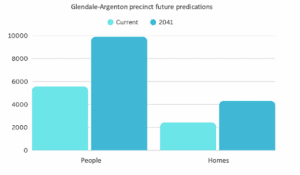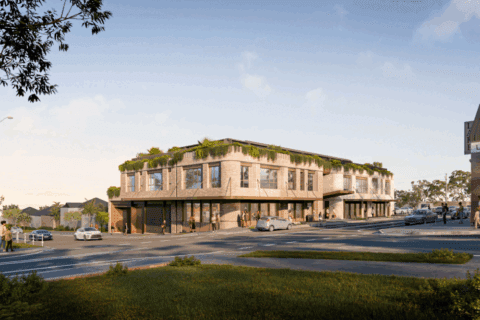Strategic Location & Infrastructure
Situated within the North-West Lake Macquarie Catalyst Area, Glendale is positioned to support future-focused business growth. Just 10 minutes from the M1 Pacific Motorway and under 30 minutes from Newcastle CBD, the Port of Newcastle, and Newcastle Airport, Glendale offers direct access to major logistics corridors serving both domestic and international markets. The area benefits from strong freight connectivity, with well-established road and rail infrastructure supporting the movement of manufactured goods, construction materials, and consumer products. Glendale also connects to the Hunter’s established mining industry. Strengthening its position as a business and employment hub, Glendale is home to a TAFE NSW campus and Glendale Technology High School, contributing to local workforce development and supporting skills in trades, technology, and innovation.
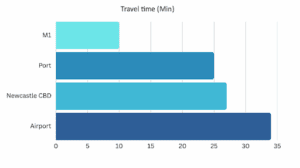
Key Facts
- Glendale is one of three strategic regional centres within Lake Macquarie.
- The Hunter regional plan priorities include infrastructure like high-speed fibre optic internet to boost economic activity and attract businesses and residents.
- The suburb is part of the Northwest Lake Macquarie Catalyst Area, which is projected to support more than 13,000 new residents, 5,200 new homes, and 3,000 additional jobs over the next 20 years.
Economic Strength & Business Opportunities
Glendale contributes $1.1 billion in economic output annually, representing 3.4% of Lake Macquarie’s total output. The suburb held 1,535 jobs in 2021 and maintains a strong employment rate of 94.4%. Glendale’s leading industry is manufacturing, producing $246.5 million in output making up 22.4% of Glendale’s total output. Retail trade is the largest employer, with 1,032 jobs and $160 million in output, indicating the suburb’s strength as a commercial and consumer hub. Glendale is well-positioned to attract investment in logistics, retail, and build on the already established manufacturing sector.
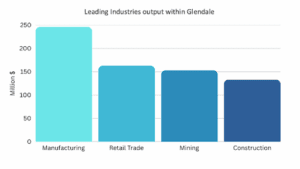
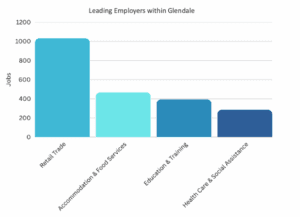
Key Facts
- Retail trade generates $155,134 of output per job.
- Glendale has been earmarked as a major focus for commercial and retail development, with plans to enhance its role as a transport hub and expand shopping facilities and community amenities.
Commercial & Industrial Real Estate
Glendale offers a competitive commercial property market with flexible options for both sale and lease. Properties include Mixed-Use sites and developable land, warehousing, and industrial. Lease opportunities range from compact consulting suites (12m²) to large-format retail spaces (up to 385m²). This variety allows businesses of all sizes and sectors to find suitable premises at competitive rates, especially appealing when compared to inner Newcastle, and western Sydney where average rental costs are higher.
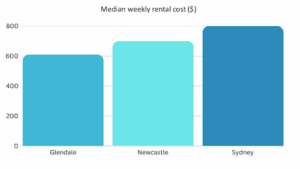
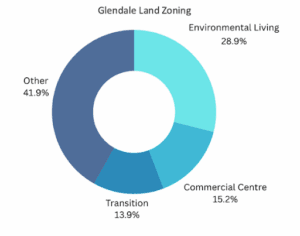
Key Facts
- Glendale’s commercial appeal is growing, highlighted by the $315 million sale of Stockland Glendale.
Workforce & Education
With 15.2% of the University of Newcastle’s student population residing in Lake Macquarie, Glendale benefits from proximity to a highly educated and diverse talent pool. Over 8,000 UON graduates enter the workforce annually, complemented by TAFE NSW’s 9,790 and Avondale University’s 241 students locally enrolled within Lake Macquarie. This access to graduates in fields such as business, law, health, engineering, and trades supports innovation and new perspectives fostering a progressive working environment. The strong education ecosystem fuels Glendale’s growing potential as a destination for research, enterprise, and talent.
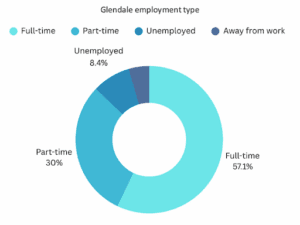
Key Facts
- The suburb has a median age of 36, with 24.7% of its population holding tertiary qualifications.
- Improved infrastructure and amenities will attract new residents looking for a high-quality of living conditions
Future Growth and Investment Potential
Glendale is projected to undergo a $78.6 million transformation that will see the development of 599 apartments, 117 townhouses, new green spaces, and upgraded transport connections, with the suburb projected to house 9,903 residents by 2041 (3,260 in 2021). Glendale’s evolving role as a key commercial and transport hub is reinforced by plans to enhance shopping precincts to support more local shops and services, public transport links, and land development for medium density housing. With more than 35 hectares of government land being redeveloped and growing demand for industrial and retail space, Glendale represents a high-opportunity environment for investors focused on long-term growth in the Lake Macquarie region.
